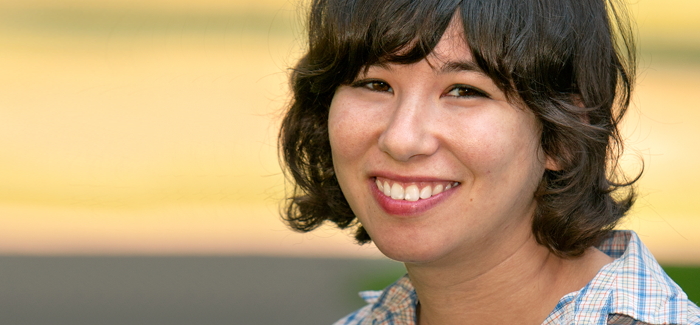
(Photo courtesy Kenyon College)
Going to the Law School helped Natalie Shapero, JD’11, let her poetry loose.
Last September Natalie Shapero, JD’11, was awarded a 2013 Ruth Lilly Fellowship from the Poetry Foundation and Poetry magazine, one of the most prestigious prizes for poetry in America. It came soon after the publication of her first book, No Object (Saturnalia Books), written during her three years at the Law School.
Shapero’s poems overlay quirky imaginative leaps on formal frames of meter and rhyme, at once spontaneous and controlled, like a figure-skating routine set to the Ramones. In “Your Other Heart,” for example, she spins the story of an ill-fated rescue dog on moments of wordplay: “I took in a dog the way some might take in / a dress,” and, later, “That dog: I called it Help, and I cried for it.”
Shapero spent one year as a Steven Gey Fellow with Americans United for Separation of Church and State before returning to poetry full time as the Kenyon Review Fellow at Kenyon College, where she teaches undergraduate creative writing. The Magazine’s interview with her is condensed and edited below.
Stranger in a strange land I think of my time in law school like going to live in another country and learn the language and culture and expand the mind and heart that way. It almost feels like going backward, in terms of where you are in the discipline. Most people who go to MFA programs have been writing for a long time and are trying to hone something that they already have a handle on. Whereas in law school everyone is starting from scratch—no one’s been practicing law in advance. I felt like I was sitting farther back from what I was trying to see.
Putting on a new suit I worked at a nonprofit that did litigation and advocacy to promote the Establishment Clause, which is the part of the First Amendment that guarantees the separation of church and state. It was great. It was a real crash course in how actual lawsuits proceed. Law school was a great education and very theoretical, which I was really digging while I was there, but when I came out of law school I didn’t know how to bring a lawsuit or what happens on the ground. I had taken classes about the procedural rules of lawsuits, but there’s no substitute for actually being involved in one. It was really fascinating, and I love constitutional law, so the subject matter appealed to me a lot. And I got to work with some really awesome clients.
Critical thinking and poetic form I continued to write formal poetry through my MFA program, and it was getting increasingly elaborate and weighted down by its own insane trickery. The classes in law school were really terrific, and they were like a pressure release valve for the analytical part of my brain, which freed up the poetry-writing part of my brain to kind of chill out a little bit. No Object does have a lot of formal impulses in it, and a number of the poems are in pentameter, but mostly what I wrote then and write now is free verse that is inflected with metrical phrasing. I feel like that’s the voice that I found my way into that I’m happy with.
Exactitude I try in my own writing to calibrate a metaphor as tightly as I can to what I’m talking about underneath the surface. But the danger with that is that your poems get too packed, so you have to find other ways of introducing wildness into the poem. There’s something to a poem representing a little bit of the messiness of actual life and not being sewn up shut too much. I’m a disciple of Robert Frost in a lot of ways: “no surprise in the writer, no surprise in the reader.” And as a reader I’m always looking for a book to tell me something that I couldn’t have come to on my own. I want to write poems that tell me something I couldn’t have come to on my own, in the absence of taking that trip.
Jolly good fellow Fellowships have been incredibly helpful in terms of allowing me to carve out time and space for writing in my life. It’s a difficult thing to do. I’m kind of a slow writer, and I work best when I have focused time that I can devote to it. I’m pretty steadily at work on a second book in a way that I wouldn’t have been able to without the fellowship, so I’m very, very happy about that.
On being wrong I try to write a lot of poetry about being wrong, and from the stance of someone who is wrong, working through the problems of the world to try to come to an answer. It’s a nice place of vulnerability and humility to start from, saying “I don’t understand this.” I try to read pretty broadly and use a lot of diverse sources in my poetry—and not just poetry but scholarly literature and pop literature—to see how other people are thinking through the problems of the world. And I try to chart those same trajectories through the smaller problems of my own world.
Advice to young poets Get out of your poetry head, even just a little bit.
